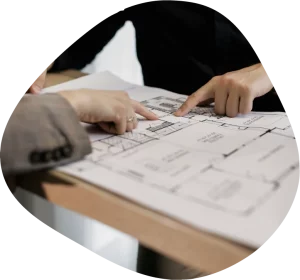Overview
What is an civil engineer?
Civil Engineers are professionals in the built environment that are responsible for planning, designing and managing construction projects. A broad discipline, they can be involved in the construction and maintenance of everything from buildings and large structures to roads, bridges and tunnels.
Civil engineering covers a wide range of job roles and specialisms, including Civil Engineer Consultants, who design projects, and Civil Engineer Contractors, who take plans and turn them into real structures.
How much do Civil Engineers earn?
The average salary of a Civil Engineer is usually between: £28,000 – £60,000

Skills
What’s required for the role?
- Strong communication skills
- Creativity and problem-solving
- Analytical techniques and skills
- Attention to detail
- An interest in design and the structure of buildings
- Knowledge of building regulations and safety standards
- Technical competence and design skills
- Teamwork and collaboration
- Leadership
- Reasoning skills
- The ability to negotiate
- People and project management
- Maths and numerical skills
- IT and digital literacy
Details
What does a Civil Engineer do?
Professionals in civil engineering have a wide range of responsibilities, which can vary depending on the nature of their work and employer. Some of these include:
What is the work environment like?
Working as a Civil Engineering Contractor is a hands-on role, so expect to spend the majority of your time on-site in this profession – regardless of the weather. Due to the size of major projects like bridges and tunnels, you may find you’re working on a particular site for as long as a year.
Conversely, the consulting side of the civil engineering profession will see you work on multiple projects at once, with a significant amount of time spent liaising with clients, attending meetings and giving presentations.
Opportunities
Is Civil Engineering a good career?
Civil engineering is a prime example of how a career in construction is more than just mud, hardhats and hi-vis jackets. This profession combines hands-on, practical responsibilities with data, mathematics and the latest digital technologies. It’s also an exceptionally varied role, giving you the ability to work on a whole host of different projects, each with their own unique challenges.
In the UK, there simply aren’t enough Civil Engineers needed to meet the escalating demand for infrastructure. By 2030, it’s anticipated that the country will be in need of one million engineers. Professionals with the right skills and experience are in high demand, making this a career that can offer long-term security and longevity.
It’s also an area of the built environment with significant opportunities for growth and progression. Civil engineering is full of pathways and sub-disciplines to specialise in, such as:
- Coastal engineering
- Geotechnical engineering
- Structural engineering
- Transportation engineering
- Mechanical engineering
- Chemical engineering
- Sanitary engineering

Become a civil engineer
Who can become a Civil Engineer?
Civil engineering is an area in need of talent, so anyone with an interest in construction, buildings and engineering can launch a career in this field, regardless of their background. At UCEM, students from across the world are undertaking their studies and entering industries like civil engineering. Find out about their experiences below:
How to become a Civil Engineer
Entry into civil engineering is typically via an engineering degree or similar qualification, or through an apprenticeship. Both undergraduate and postgraduate degrees are available. Civil engineers can work towards membership and recognition from professional bodies like the Institution of Civil Engineers (ICE).
Along with obtaining degrees and pursuing memberships, online CPD courses in relevant subjects can strengthen your employment credentials, such as:
Conducting a life cycle assessment (LCA) – UCEM Online Academy







